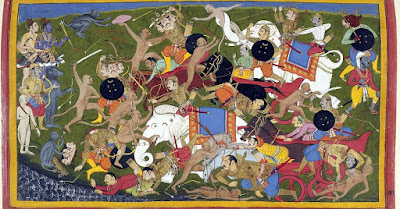POINTS TO REMEMBER IN ENGLISH LITERATURE- SERIES 4
1. The Greek Philosopher Plato in his work Republic presented the Allegory of the Cave or Plato's Cave to compare how education changes us for the good and effect of the lack of the same on human nature. It is narrated by Socrates and the dialogue is between Plato's brother Glaucon and his mentor, who is Socrates- the narrator.
2. An Essay on Man, written by Alexander Pope in 1733-34 was dedicated to Lord Bolingbroke. The poem was written in heroic couplets of Iambic Pentameter. It was an effort to 'vindicate' rather than 'justify' unlike Milton in the opening of Paradise Lost. (PAPER 2, Q14, 2004)
3. Containing four epistles, An Essay on Man is a philosophical work and has been praised by writers in Europe like Voltaire, Rousseau, and others.
4. TheVanity of Human Wishes by Samuel Johnson is based on the tenth satire of Juvenal. Its full title is The Vanity of Human Wishes: The Tenth Satire of Juvenal Imitated. It was published in 1749. (PAPER 2, Q15, 2004)
5. A Dictionary of the English Language (1755) was written by Samuel Johnson. It is considered one of the most influential dictionaries in the history of the English Language.
6. Oxford English Dictionary was completed 173 years after Johnson's Dictionary. Until then, Johnson's Dictionary was seen as the standard.
7. Written in closed Heroic couplets, The Vanity of Human Wishes consists of 368 lines.
8. Published in 1738, London by Samuel Johnson is a poem of 263 lines. It copies Juvenal's third satire. London is considered to be Johnson's first major work.
9. Lives of the Most Eminent English Poets(1779-81), a biography and periodical essays- The Rambler, The Idler, and The Adventurer were written by Dr Samuel Johnson.
10. Alexander Pope's poem Messiah (1712) was translated into Latin by Samuel Johnson in 1728.
11. Richard Savage was a poet based in London. He was a friend of Samuel Johnson. He passed away in 1743. Life of Savage was the first biography published by Johnson in 1744.
12. Published in 1759, The History of Rasselas, Prince of Abissinia or The Prince of Abissinia: A Tale or The Choice of Life falls under the genre of theodicy, apologue, and fable. There has been a long debate among the critics as to classify it as a novel.
13. Theodicy comes from Greek words 'theos', which means ' god ' and ' dike' means 'justice'. It is a vindication of God and explains why a perfect, almighty God let evil happen.
14. Apologue is a short allegorical story or fable. An apologue is different from a fable because the moral is more important than the narrative details. Some well-known examples are Aesop's Fables, George Orwell's Animal Farm, Brer Rabbit stories by Joel Chandler Harris and others.
15. Parable is different from fable with respect to the characters. The parable has humans whereas the fable has animals, plants, elements of nature and inanimate objects as characters.
16. The similarity between apologue and parable is that both are instruments of moral lessons and rhetorical argument.
17. As a literary device, allegory is a narrative(a narrative is a story or a tale that has series of events) in which a character, event or place conveys a larger message. Difficult and complex meanings are often conveyed through symbols, imagery, events, personification or actions which come together to form a meaning which the author wishes to convey.
18. The final version of The Prelude appeared in the year 1850. It was shortly published in 14 books after his death. ( PAPER 2, Q 16, 2004)
19. The Prelude or, Growth of a Poet's Mind: An Autobiographical Poem is written in blank verse. Originally, it was planned to be an introduction to The Recluse.
20. Wordsworth started writing The Prelude in the year 1798. He never gave the title to his poem. In the letters to his sister Dorothy, he called it 'Poem to Coleridge'. The present title has been given by his widow Mary.
21. The Prelude, in short, depicts the growth of the poet's mind and the oneness between the world of nature and man.
22. " To Suffer woes which Hope thinks is infinite " was written by Shelley. The lines have been taken from the poem Prometheus Unbound. (PAPER 2, Q17, 2004)
23. Prometheus Unbound is a four-act lyrical closet drama based on the Greek mythological figure Prometheus, who defied Gods to give fire to humanity.
24. The play first published in 1820 was written in Romantic tradition. It was not supposed to be performed on stage, but was rather left to the imagination of the readers.
25. Prometheus Unbound takes inspiration from classical Prometheia, which is a trilogy written by Greek tragedy author Aeschylus.


Comments
Post a Comment